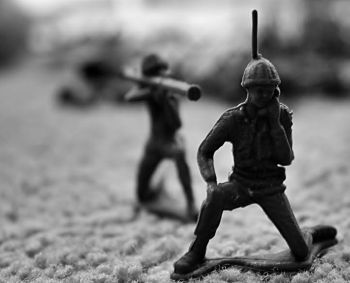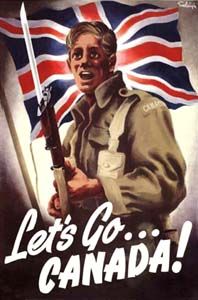
Publisher:
Bonnie King
CONTACT:
Newsroom@Salem-news.com
Advertising:
Adsales@Salem-news.com

~Truth~
~Justice~
~Peace~
TJP
Aug-30-2012 13:23

 TweetFollow @OregonNews
TweetFollow @OregonNews
The Fighting CMTC
Bill Annett Salem-News.com“We'll call it the CMTC,” said Jack, “Consort Military Training Corps.” “Yeah,” said Red, “The Fighting CMTC.”
 |
(SASKATCHEWAN) - Much has been written since World War II about The Princess Pats, (Canadian Light Infantry), the Van Doos (The Royal 22nd Regiment), the Essex Scottish, The Winnipeg Rifles. But there is one unsung history of another magnum force known to its members as “The Fighting CMTC,” so named mostly because of their fighting among themselves.
It began like this:
We were walking back from the swimming hole one hot July day in 1939, probably thinking about the looming war in Europe, when my brother Jack stopped short in his tracks and said:
“Let's start an army – I'm Captain.”
In rapid succession: “I'm Lieutenant,” from Bill Henry (Hank), “I'm Sergeant,” from Art Wiltse, “I'm -” groped Red Topham, but the self-appointed Captain had already cut him off. “That's enough officers and NCOs,” said Jack. “The rest of you guys are Privates.”

Freshly drafted, we looked at each other, Red, me, Slug Suey, the Day boys, Butch, Spike and Pebo, and Len Frayne and his kid brother Level-ears. The logic of Jack's T.O. & E. was not lost on us. There were just enough private soldiers for a column of twos plus a standard bearer, not counting the brass We mobilized rapidly all the way up Station Hill and into our little prairie town, Consort, Alberta. Jack, mostly, sketched in the logistics. He was a one-man G-1, G-2, G-3 and Judge Advocate Section.
“We'll call it the CMTC,” said Jack, “Consort Military Training Corps.”
“Yeah,” said Red, “The Fighting CMTC.”
The fighting tradition got under way immediately, first over our headquarters. Jack plumped for my family's backyard, as befitting the CO. Sergeant Wiltse had other ideas: his yard was better situated, he suggested, beside a vacant lot. Jack issued an ultimatum, against which everybody but me rebelled. I abstained, mindful of a punch-out later.
But Jack, unyielding, resigned his recent commission and was separated from active service on the spot. Bill Henry joyfully assumed command, Art Wiltse was commissioned Lieutenant immediately, and Red Topham at long last made Sergeant. (But not for long.)
Uniforms. Our gold-star mothers set aside their wartime knitting of Balaclava helmets long enough to create red tunics, black denim pants with red stripes, pillbox hats, red with black peaks. Oh yes, and red kepis covering our necks. (“Beau Geste,” a story about the Foreign Legion had just played the local theater; we knew the danger of the desert sun.)
Rifles. Reluctant fathers were dragooned into sawing makeshift Lee-Enfields out of wallboard, broom handle sections for gun barrels, painted black. The NRA would have cheered.
Art's wisdom in selecting his yard as our HQ and bivouac area soon became evident. The vacant lot next door became an excellent parade ground. And in the assignment of fatigue and other details both to occupy and discipline the troops, there was immediately available in Wiltse's yard weeding, the chopping of firewood, splitting kindling, in a word all of Art's regularly assigned chores, which he was willing to donate to the cause. But Art had even more serious fish to fry, which we'll get to in a moment.
But first, the CMTC had to deal with its recently created Sergeant, who had become something of a disciplinary problem. Red just couldn't get serious, being a born clown; besides, in off-duty hours he was known to consort with the recently cashiered Captain, my recently departed brother Jack, which had a devastating effect on Red's loyalty and esprit de corps. Red had to go, we decided. So with leadership from Hank and Art, we gave him a Section 8, or conduct unbecoming a soldier.
But more seriously, a coup d'etat, a veritable palace revolt was even then brewing, and right at the heart of the organization. Flushed with his success over determining the locale and the proximity of his chores as a medium for work details, Art began what can only be called a whispering campaign about Hank's inadequacy as our CO. According to the mutinous Lieutenant Wiltse, Hank lacked command presence, he was younger than Art by two years and, most decisively, Art's Dad owned a general store, ergo, the occasional candy bar largesse was available to friends of the Lieutenant. So lobbied, we the remaining foot soldiers signed the petition that art had artfully composed, even though we realized that in the face of the enemy, we could all be shot.
Art seized control on a bright afternoon when the Corps was drawn up in a single rank close to Art's woodpile. Captain Henry facing us, pronounced: “At ease!”
Lieutenant Wiltse stepped forward, saluted and said: “Sir, there's a message for you.”
In the finest military style he whipped a piece of paper from the cuff of his tunic, presented it to his Captain, and stepped back. The Captain unfolded the paper and read it as we all squirmed. We knew the contents, having watched Art compose it, and in fact all of us being signatories:
“Hank, yer all right, but we want Art to be Captin.” There followed the grubby signatures of every man jack of us.
Captain Henry burst into tears.
Confusion reigned suddenly in the ranks, or rather the rank. We broke formation, dropped our rifles, crowded forward, brushing Lieutenant Wiltse aside, although he joined us as we encircled our old man. As one man we surrounded and gripped him: “It's okay, Hank, you can stay Captain.”
Admirably, I always thought, Hank never exacted any revenge on Art – or us, for that matter - for our attempted mutiny. Had he been a Captain Queeg, a court martial would have dispatched us all.
That was perhaps our most serious engagement, but there were other challenges. When Canada declared war that September, we staged a massive parade that started at the tennis court beside the old hospital and proceeded the entire two blocks of Main Street to Suey's Restaurant and Store. Single file, silently, save for the tunk-tunk, tunk-tunk-tunk of Slug Suey's drum, a cardboard former candy container his father had donated because it was painted to look like a drum, even if it didn't sound like one.
And we had also to withstand the carping criticism while on parade emanating from the caragana hedge of the United Church yard next door, where Jack and Red hung out while we were drilling. They derided our lack of professionalism, our sloppy arms drill, even our chopping of Art's firewood. (Red's Dad and my father, as World War I vets, were members of a “Veterans' Volunteer Reserve,” and Jack and Red managed to purloin their “VVR” armbands, posing as older, more battle-hardened veterans.) We ignored them, as GS soldiers later spurned Zombies.
But I've often thought in the decades since that, although this was the way small boys looked at war, it wasn't really such a bad thing. It was a game in which no one was hurt, except occasionally for their feelings, and nobody died.
If only adults could reach that sort of maturity.

Bill Annett grew up a writing brat; his father, Ross Annett, at a time when Scott Fitzgerald and P.G. Wodehouse were regular contributors, wrote the longest series of short stories in the Saturday Evening Post's history, with the sole exception of the unsinkable Tugboat Annie.
At 18, Bill's first short story was included in the anthology “Canadian Short Stories.” Alarmed, his father enrolled Bill in law school in Manitoba to ensure his going straight. For a time, it worked, although Bill did an arabesque into an English major, followed, logically, by corporation finance, investment banking and business administration at NYU and the Wharton School. He added G.I. education in the Army's CID at Fort Dix, New Jersey during the Korean altercation.
He also contributed to The American Banker and Venture in New York, INC. in Boston, the International Mining Journal in London, Hong Kong Business, Financial Times and Financial Post in Toronto.
Bill has written six books, including a page-turner on mutual funds, a send-up on the securities industry, three corporate histories and a novel, the latter no doubt inspired by his current occupation in Daytona Beach as a law-abiding beach comber.
You can write to Bill Annett at this address: bilko23@gmail.com
 |
 |
 |
 |
 |
 |
 |
Articles for August 29, 2012 | Articles for August 30, 2012 | Articles for August 31, 2012
Quick Links
DINING
Willamette UniversityGoudy Commons Cafe
Dine on the Queen
Willamette Queen Sternwheeler
MUST SEE SALEM
Oregon Capitol ToursCapitol History Gateway
Willamette River Ride
Willamette Queen Sternwheeler
Historic Home Tours:
Deepwood Museum
The Bush House
Gaiety Hollow Garden
AUCTIONS - APPRAISALS
Auction Masters & AppraisalsCONSTRUCTION SERVICES
Roofing and ContractingSheridan, Ore.
ONLINE SHOPPING
Special Occasion DressesAdvertise with Salem-News
Contact:AdSales@Salem-News.com



Salem-News.com:
Terms of Service | Privacy Policy
All comments and messages are approved by people and self promotional links or unacceptable comments are denied.
[Return to Top]
©2026 Salem-News.com. All opinions expressed in this article are those of the author and do not necessarily reflect those of Salem-News.com.